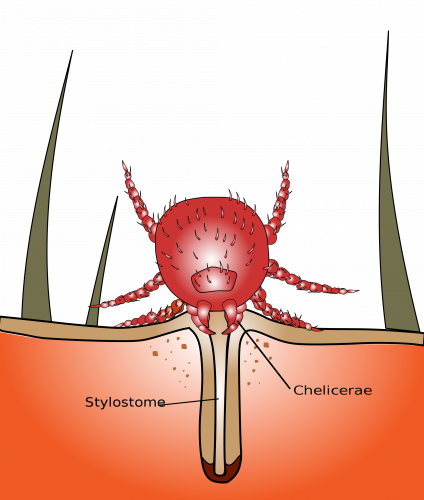You take a trip to the lake when you discover hundreds of microscopic red pests, no more than 0.3 millimeters long, latched onto your pants. They make their way to a patch of skin, where they inject their saliva using their sharp claws. Your skin turns red, and for the next few days, an uncomfortable itch irritates you. These mite larvae, known as chiggers, are no stranger to nature-lovers, and are not dangerous in most cases. However, recent case studies conducted by researchers at Wake Forest Baptist Medical Center and the University of Virginia suggest that for some people, chigger bites may cause a rare allergic reaction to mammalian meat known as alpha-gal allergy.
Alpha-gal allergy is a reaction to galactose-alpha-1,3-galactose, a small carbohydrate found in all non-primate mammals. One common cause of alpha-gal sensitization is tick bites. Studies conducted within the last decade have revealed the presence of alpha-gal in the digestive tract of certain tick species. Upon biting humans, ticks inject alpha-gal into our blood stream. If our immune system detects the alpha-gal, it can react by producing an excessive number of allergic antibodies. High levels of these antibodies can lead to hypersensitivity to red meat.
Russell Scott Traister, MD, PhD, an assistant professor at Wake Forest Baptist, discovered the first case of chiggers causing alpha-gal sensitization in January 2018. A 67-year-old man was bitten by hundreds of chiggers while hiking in North Carolina. Four weeks later, he reported four different allergic reactions three to four hours after consuming red meat. The man, however, did not report any tick bites.
“He was very insistent that he had not been bitten by ticks in quite some time, and he wears tick repellent clothing,” Traister said. “This is what sparked my curiosity because we could not find previous literature regarding chiggers causing this particular type of reaction.”
Several others also reported an allergic reaction to red meat after coming into contact with chiggers. A 28-year-old man, who was bitten by fifty chiggers, reported an allergic reaction four hours after consuming beef. A 46 year-old-woman developed hives and swelling three hours after eating meatloaf. She reported bites from tiny red insects and no recent tick exposure.
Intrigued by these cases, Traister contacted Thomas Platts-Mills, MD, a professor at the University of Virginia. Mills was the first to discover that tick bites caused alpha-gal allergy in 2002, and Traister wanted to investigate whether or not chigger bites can also play a role. A subsequent questionnaire administered by researchers at Virginia provided more evidence corroborating this hypothesis. Of the 301 respondents who developed alpha-gal allergy, 17 reported only being bitten by chiggers.
As more cases come to light, the implication is that allergists should consider chigger bites as a possible cause for alpha-gal allergy. However, further studies still need to be conducted. According to Traister, one of the biggest challenges they are currently facing is a lack of an animal model.
“Alpha-gal is also often overlooked, and we miss some cases because the symptoms are so delayed. People eat meat and wake up in the middle of the night 6 to 8 hours after that with anaphylaxis [acute allergic reaction] and don’t know what caused it,” he said.
Moving forward, the team is searching for more reports of people being bitten by chiggers and consequently developing alpha-gal allergy. Meanwhile, in the laboratory, researchers are searching for the presence of alpha-gal in the gastrointestinal tracts of chiggers, which would provide strong evidence for their hypothesis.

